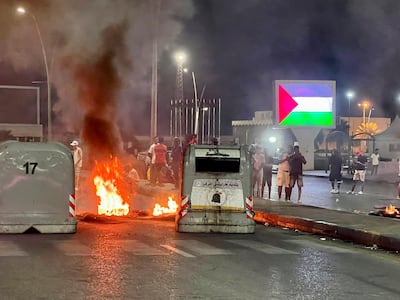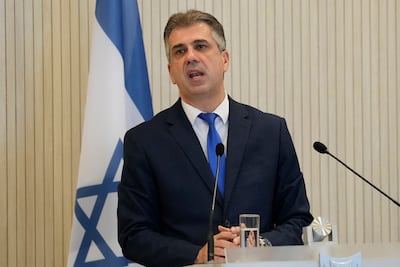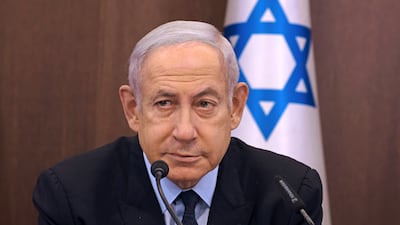Prime Minister Benjamin Netanyahu drastically curtailed the ability of government ministers to conduct diplomatic business independently, days after a blunder by Israel’s Foreign Minister caused a backlash in Libya.
Mr Netanyahu on Tuesday banned ministers from holding and publicising details of secret diplomatic meetings without approval from his office, two days after Eli Cohen announced he had sat down with his Libyan counterpart Najla Mangoush in Italy.
The announcement of the meeting – the first of its kind between foreign ministers from the two countries – caused riots in Libya and stern rejections from senior Libyan officials.
Mr Cohen said he had spoken to Ms Mangoush about “the great potential for the two countries from their relations”, Israel's Foreign Ministry said on Sunday.
He spoke of “the importance of preserving the heritage of Libyan Jews, which includes renovating synagogues and Jewish cemeteries in the country”, the ministry added.
Soon after Mr Cohen’s announcement, Libya’s Prime Minister Abdul Hamid Dbeibeh, who heads the Government of National Unity, fired Ms Mangoush. She has since fled to Turkey.

Senior Libyan officials denied any knowledge of the meeting.
Israeli opposition politicians condemned Mr Cohen’s revelation of the meeting, accusing him of endangering Israel’s sensitive and often secret ties with Arab countries and prospects for eventually normalising relations with them.
Opposition leader Yair Lapid said on Monday: “Countries of the world this morning are looking at the irresponsible leak of the meeting of the Israeli and Libyan foreign ministers and asking themselves: 'Is it possible to manage foreign relations with this country? Is it possible to trust this country?'”
Haim Tomer, a former senior Mossad official who throughout his career helped foster secret channels with many Arab states, on Tuesday said Mr Cohen’s actions would put discussions between Israel and Libya “on ice for some time”.
“There seems to me to be two possible reasons Mr Cohen made the announcement,” he said.
“One is to exploit the moment for personal political gain. The other is that he didn’t understand that the condition for continuing such relationships is keeping things secret. From my long experience, meetings like this start and end with both sides agreeing to total secrecy.”

Israel has discreet relations with a number of Arab states, even though it does not have official ties with much of the region. Israel’s intelligence community often first establishes contact, which then turns into wider but still secret engagement led by its Foreign Ministry.
Violent protests in Libya followed Mr Cohen's statement, with protesters torching Israeli flags, tyres and even Mr Dbeibeh’s home.
The country has been in civil war since former ruler Muammar Qaddafi was overthrown in 2011.
Libya has since been divided between rival governments in Benghazi in the east and Tripoli in the west.
Long-awaited elections have been delayed on a number of occasions, which has added to anger among many Libyans.
Ms Mangoush represented the UN-recognised government based in Tripoli and was the first woman to take on the position of Foreign Minister.


